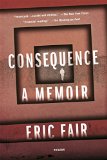Summary | Excerpt | Reviews | Beyond the Book | Readalikes | Genres & Themes | Author Bio

A Memoir
by Eric Fair
The general asks me about my time in the Army. I tell the general I was a sergeant, not an officer like him. He finds this hard to believe, because most enlisted Iraqi soldiers have little or no education. I tell him that I was a paratrooper, and talk about my time learning to jump out of planes and patrol the swamps and forests of American military bases. Training was difficult, but it helped us become better soldiers. The general gets excited when I mention that I served with the 101st Airborne Division. He says his unit was like mine. He mentions the Hammurabi Division.
But now that he is comfortable and the conversation is easy, the general has just confessed to a lie. The Hammurabi Division was a part of Saddam Hussein's Republican Guard, trusted troops who were expected to defend Baghdad to the death. But they didn't. They surrendered and blended back into the populace. The general hasn't mentioned this before, and while it's not critical intelligence information, it's a slip that is enough to change his status at Abu Ghraib: he's now a high-value prisoner. His interrogations will be more frequent. They won't be conducted in the booth with comfortable chairs anymore.
But I pretend not to notice his mistake. I steer the conversation away from the military and avoid subjects related to the war. I want to re-create the world we were just in, a world where I am kind to an old man and he says nice things about the way I speak Arabic. I don't want to admit that the general is probably trying to manipulate me, fishing for common ground and finding ways to relate. But our discussion about church and mosques and calls to prayer has reminded me about where this journey to Abu Ghraib started, and how far away I am from where I had hoped it would go.
At Abu Ghraib, I have put my hands on detainees, shoved them into walls, and turned a blind eye when others did the same. I have walked the halls of the hard site where the harshest interrogations take place, and averted my gaze from one of the most appalling chapters in American history. But as I talk to the general, I pretend there will be a day when these memories have faded, when all I remember are good conversations with Iraqi generals and the decent tea I learned to serve. I can go back to my Presbyterian church and pray to my god. But that's an illusion, too.
As the hour with the general comes to a close, I'm convinced I've developed a genuine rapport. It's worth making one final effort to ask about his sons.
I give the general a speech about the future of Iraq, a speech that, by now, I've given to many detainees, about how we need honest and brave men willing to carve out a new future for Iraq. It doesn't matter why America invaded Iraq or what mistakes were made along the way; all that matters is we move forward and stay on the path. The right choices will build a strong foundation for a new Iraq. The wrong ones will have consequences.
The general is nodding in agreement, so I return to the issue of his sons. In an effort to establish common ground, I tell him I have kids, too. I don't. But when I do, this speech will haunt me.
I say that someday our sons will ask us about what we did here. We will tell them that we made the right choices, the difficult choices, and they will be proud of us.
The general is crying. Even the translator, who has three sons of her own, is beginning to tear up. I'm tempted to think I've gained the general's trust, that he's willing to provide information about his sons, and that he thinks of me as a decent man.
None of this is true. Instead, I've succeeded only in making all of us homesick.
I deliver the final part of the speech in my own broken Arabic, but the translator still repeats my words. The general hears both my heavily accented Arabic and the translator's perfect Iraqi dialect. It comes to him as an echo.
Excerpted from Consequence by Eric Fair. Copyright © 2016 by Eric Fair. Excerpted by permission of Henry Holt and Company. All rights reserved. No part of this excerpt may be reproduced or reprinted without permission in writing from the publisher.




Show me the books he loves and I shall know the man...
Click Here to find out who said this, as well as discovering other famous literary quotes!
Your guide toexceptional books
BookBrowse seeks out and recommends the best in contemporary fiction and nonfiction—books that not only engage and entertain but also deepen our understanding of ourselves and the world around us.